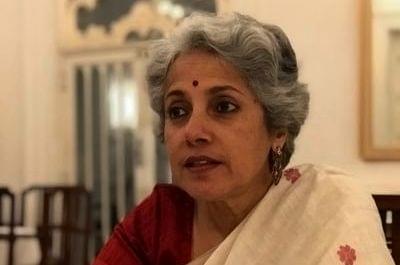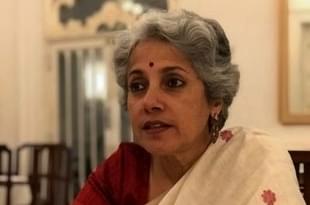News Brief
WHO's Chief Scientist Warns Against Covid-19 Vaccine Cocktail, Calls It 'Dangerous Trend'
Bhaswati Guha Majumder
Jul 13, 2021, 02:22 PM | Updated 02:22 PM IST
Save & read from anywhere!
Bookmark stories for easy access on any device or the Swarajya app.


The World Health Organization's chief scientist Soumya Swaminathan warned against mixing and combining Covid-19 vaccines from different manufacturers. She called such practices a "dangerous trend" due to the lack of data on the health consequences.
During the WHO's latest online briefing on the coronavirus pandemic, the United Nations healthcare expert made these comments. She said: "It's a little bit of a dangerous trend here. We are in a data-free, evidence-free zone as far as mix and match. It will be a chaotic situation in countries if citizens start deciding when and who will be taking a second, a third and a fourth dose".
Infectious disease experts are debating whether those who received the single-dose vaccine from Johnson & Johnson should get a booster shot of the Pfizer-BioNTech or Moderna mRNA-based vaccines, which are reported to be more effective against the threatening Delta variant. Dr Angela Rasmussen, a researcher at the University of Saskatchewan's Vaccine and Infectious Disease Organization, made headlines when she tweeted in June that she had received one dosage of Pfizer-BioNtech's mRNA vaccine after receiving Johnson and Johnson jab in April this year.
She wrote on Twitter that "I got an mRNA booster of Pfizer vaccine yesterday to top off the J&J vaccine I received in April. I have a sore arm but am fine otherwise. I made sure that in my province this wouldn't take away a dose for an unvaccinated person in my community". The researcher also said in the same Twitter thread that "I think I did the right thing to make sure I am as protected as possible from the delta variant and thus am protecting others who only have one shot since Canada right now is rushing to fully vaccinate as many people as possible." However, she also asked other J&J vaccine receivers to speak with their doctors to know whether they can do the same, especially if they live in areas with poor vaccination rates.
I agree with this, given both the knowns and unknowns about the J&J vaccine. https://t.co/9Bc4fs8cBQ
— Dr. Angela Rasmussen (@angie_rasmussen) June 22, 2021
Meanwhile, the American pharmaceutical company Pfizer is urging the United States and European regulators to approve its Covid-19 booster shots. But the Food and Drug Administration (FDA) and Centers for Disease Control and Prevention (CDC) do not see a necessity for a booster shot at this moment. These federal agencies have also clarified that people who received two doses of vaccines do not need the booster shots. Even Swaminathan also believes that the requirement of boosters "has to be based on the science and the data".
During the latest press briefing, the WHO's director-general Dr Tedros Adhanom Ghebreyesus, said that instead of offering booster shots to highly vaccinated, wealthy countries, the companies like Pfizer should send those vaccines to the WHO to be distributed to poorer nations whose unvaccinated citizens urgently require them as a protection against the Delta variant that is "ripping around the world at a scorching pace".
Cocktails of Vaccines
According to Gavi, which is a public-private global health partnership to increase access to immunisation in poor countries, for several reasons, mixing vaccines could be a good idea. It explained that vaccine shortages have occurred in many countries due to supply constraints; therefore, the ability to mix vaccines from different producers may alleviate the pressure on vaccine supplies. Furthermore, it stated that "there is some preliminary evidence to suggest that it could also potentially lead to a stronger immune response compared to two doses of the same vaccine. Some countries are planning to mix vaccines because of supply shortages or concerns over rare side effects of some products".
Additionally, Gavi said: "Besides the potentially positive impact on the immune system, another possible added bonus of mixing vaccines could be to prevent vaccines from being rendered less effective in the face of new variants".
Earlier in 2021, the Oxford-AstraZeneca Covid-19 vaccine developers announced that they are now testing whether mixing one dose of their vaccine with the second shot of Russia's Sputnik V vaccine—both of which are adenovirus-vectored jabs—would help to increase protection. In the case of using two entirely different vaccine types, such as following an adenovirus vector vaccine with a Pfizer-BioNTech or Moderna's vaccine—which are mRNA vaccines—a study has been published recently. According to the CombivacS study, conducted in Spain, people who received one dose of the Oxford-AstraZeneca jab and then a booster with the Pfizer-BioNTech vaccine showed a considerably stronger immune response than those who had two doses of the Oxford-AstraZeneca vaccine.
In June, the initial findings of another study in the United Kingdom also revealed that the use of different brands of Covid-19 vaccines for the first and second doses appears to provide adequate protection against the novel coronavirus. Researchers running this University of Oxford-led Com-COV study said that the Oxford-AstraZeneca and Pfizer-BioNTech vaccines, given in alternate doses, produce strong immune responses against Covid-19. Separately, researchers from Saarland University in Homburg, Germany, discovered that the combination regimen was more effective than two Oxford–AstraZeneca doses at triggering an immunological response. They also said that it was similarly comparable to or superior to two Pfizer–BioNTech shots.
But these studies are not conclusive enough because so far, the trials have been too small to determine how effective combinations of vaccinations are at avoiding Covid-19 infection. According to Nature, Martina Sester, an immunologist who led the Saarland study said: "As long as you don't have any long-term or any follow-up studies with efficacy calculations, it's hard to say" the duration or level of the protection from SARS-CoV-2. As per the article on Nature, even though no significant negative effects have yet been recorded in mix-and-match trials, early data from the Com-COV research has revealed that combining vaccines caused more side effects than delivering two doses of the same vaccine.
On the other hand, in other studies, researchers found that side effects from the combo vaccines were almost similar to two shots of the same vaccines—which according to Sester, was due to the intervals between doses. However, immunologist Leif Erik Sander at Charité University Hospital in Berlin said that there are still some safety concerns. As per the expert—who also analysed 340 healthcare workers, who got two doses of the Pfizer–BioNTech jab or an Oxford–AstraZeneca shot followed by a dose of the Pfizer–BioNTech vaccine—"You're combining two different vaccines, both of which might have their own profile of adverse events and effects," and this could amplify any problem.
However, a study in the Philippines will run through November 2022, mixing the inactivated-virus vaccine CoronaVac, developed by the Beijing-based company Sinovac, with the six other vaccinations approved in the country.





